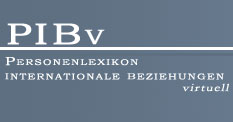Rostow, Walt W.
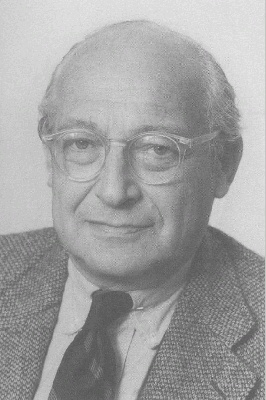
Walt Whitman Rostow
(Vornamen nach dem Schriftsteller Walt Whitman)
*7.10.1916 in New York City
†13.2.2003 in Austin (Texas)
US-Amerikanischer Politischer Ökonom, Wirtschaftshistoriker, einflussreicher Entwicklungs- und Stadientheoretiker in der Gründungsphase der Disziplin Entwicklungstheorie, Sowjetunion- und Chinaexperte, selbsternannter Antipode zu Karl Marx, Mitbegründer des neuen Politikfeldes Entwicklungspolitik in den 1950er Jahren, Programmatiker der „Allianz für den Fortschritt“ in Lateinamerika, Theoretiker und Stratege der US-Politik im Ost-West-Konflikt und gegenüber der Dritten Welt.
Leiter des Politischen Planungstabs der Kennedy-Administration, Nationaler Sicherheitsberater der Johnson-Administration
instrumentalisierte die Entwicklungspolitik im Kalten Krieg als Teil der containment-Politik gegenüber der Sowjetunion, Liberaler mit missionarischem Anspruch, als einer der Hauptverantwortlichen für die Eskalation des Vietnam-Krieges politisch wie akademisch heftig umstritten; nach seinem Ausscheiden aus der Politik weigerte sich seine alte Fakultät am MIT, ihn wieder aufzunehmen; Freund von Max Millikan.
Werdegang
Der Vater, Victor Aaron Rostow, russischer Jude, von Beruf Chemiker, mit liberal-sozialistischen Hintergrund emigrierte im Zuge der Russischen Revolution in die USA. Mit seiner Frau Lillian hatte er drei Söhne Walt Whitman, Eugene Victor und Ralph Emerson, die nach den us-amerikanischen Schriftstellern Walt Whitman, Eugene Debbs und Ralph Emerson als Ausdruck der liberalen proamerikanischen Gesinnung der Rostows benannt wurden. Die Familie ließ sich in New Haven, Con. nieder.
1916 geboren in New York City
1932 Examen an der New Haven High School, Gewinn eines Scholarship zum Studium in Yale Studium der Volkswirtschaftslehre und Geschichte Kommilitone war Max Millikan
1936 BA in Yale
1936-1938 Studium am Balliol College in Oxford mit einem Rhodes Scholarship
1938 Rückkehr in die USA
1939-1940 Fellow des Social Science Research Council zur Fertigstellung der Dissertation
1940 Promotion in Yale mit dem Thema "British Trade Fluctuations, 1868-1896"
1940-1941 Dozent an der Columbia University, New York für Volkswirtschaftslehre
1941-1945 Wehrdienst, Major im Office of Strategic Services (OSS) unter William Donovan in London (Vorläufer der CIA), beschäftigt mit der Auswertung von Luftbildern zur Festlegung von Bombenzielen
1945-1946 Stellvertretender Vorsitzender der Division of German/Austrian Economic Affairs im State Department
1946 MA in Oxford; 1946 Professor für Wirtschaftsgeschichte in Harvard
1946-1947 Visiting Harmsworth Professor für Amerikanische Geschichte in Oxford
1947-1949 Beamter der UN-Economic Commission for Europe in Genf, Assistent von Gunnar Myrdal, Leiter der Behörde, befaßt mit dem Nachkriegsaufbau in Europa Aufgabe der Professur in Harvard
1947 Heirat mit der Historikerin Elspeth Vaughan, geb. Davies
1949 MA in Cambridge
1949-1950 nach der Kündigung der UN-Position Visiting Pitt Prof. für Amerikanische Geschichte in Cambridge
1950-1961 Lehrstuhl für Wirtschaftsgeschichte am Massachusetts Institute for Technology (MIT) in Cambridge, Mass.
1951-1961 Staff Member am Center of International Studies (CENIS), Leitung Max Millikan, zur Forschung über den Ost-West-Konflikt; hier Kooperation mit Paul A. Samuelson, Robert M. Solow, Paul Rosenstein-Rodan, Everett Hagen, Charles P. Kindleberger, Benjamin Higgins, Wilfried Malenbaum, Sola Pool, Lucian W. Pye, Donald Blackmer, Robert E. Baldwin, Richard S. Eckaus, Daniel Lerner Mitwirkung an zwei Forschungsprojekten über die Sowjetunion und die Volksrepublik China mit dem Fazit, dass der Kommunismus zum Scheitern verurteilt ist
1957 "A Proposal: Key to an Effective Foreign Policy" mit Max Millikan (im Mai 1954 entstanden)
1958 Redenschreiber von Präsident Eisenhower
1958-1959 Gastaufenthalt in Cambridge mit Vorlesungen über Economic Development; "Stages of Economic Growth" ist das Ergebnis
1959 Vortrag in Moskau "Stadien wirtschaftlichen Wachstums und Probleme der friedlichen Koexistenz"
1960 "The Stages of Economic Growth" (berühmtestes Werk) Teilnahme an der Konstanzer Konferenz der International Economic Association, die sich kritisch mit Rostows Stadientheorie auseinandersetzt; Konferenzbeiträge bilden den Sammelband "The Economics of Take-off into Sustained Growth" Kontakt mit Kennedy, Berufung in dessen Wahlkampfteam; Memorandum an Kennedy zur Dritte-Welt-Politik
1961 Mitglied in Beraterstab von Kennedy, Stellvertretender Sicherheitsberater; Memorandum: 1960er Jahre = Entwicklungsdekade Formulierung des Programms der "Allianz für den Fortschritt"; Empfehlung, Nordvietnam zu bombardieren
1961-1966 Leitung des Politischen Planungsstabs des Außenministeriums
1962 geheime Studie zur Neuorientierung der amerikanischen Außenpolitik zum Ost-West-Konflikt in der Dritten Welt, nach Indiskretion Verantwortung der Studie vor dem US-Senat
1963 nach Attentat auf Kennedy Weiterarbeit in der Johnson-Administration
1964 zusätzlich United States Member of the Inter-American Committee on the Alliance of Progress im Botschafterrang
1966-1969 Nationaler Sicherheitsberater auf dem Höhepunkt des Vietnam-Krieges
1969 Entlassung nach Wahl Nixons zum Präsidenten
1969-2003 Rex G. Barker, Jr. Prof. Emeritus für Politische Ökonomie an der Lyndon B. Johnson School of Public Affairs der Universität von Texas, Austin, nachdem die Wiederbeschäftigung am MIT abgelehnt wurde
1978 "The World Economy" (1. Hauptwerk)
1983-1984 Vortragsreise durch 34 Länder mit 100 Gastvorträgen
1990 "Theorists of Economic Growth from David Hume to the Present" (2. Hauptwerk)
1992 Gründer des Austin-Projekts
1992-1998 Vorsitzender des Austin-Projekts
2003 gestorben in Austin, Texas, an Nierenversagen. Rostow hinterließ einen Sohn, Peter Rostow, und eine Tochter, Ann Rostow.
Primärliteratur
Bücher
British Economy of the Nineteenth Century: Essays. Oxford: Clarendon Press 1949.
The Process of Economic Growth. Oxford: Clarendon Press 1953.
Mit Alfred Lewin
The Dynamics of Soviet Society. New York: Norton 1953.
Mit Richard W. Hatch/Frank A. Kiernan/Alexander Eckstein
The Prospects for Communist China. New York: John Wiley & Sons 1954. 2. Aufl. 1955. (deutsch u.d.T. Rot-China. Wirtschaft und Politik. Köln: Markus 1957)
Mit Richard Hatch
An American Policy in Asia. Cambridge, Mass.: MIT Press 1955.
Mit Max Millikan
A Proposal: Key to an Effective Foreign Policy. New York: Harper 1957. Repr. Westport, Conn.: Greenwood Press 1976.
The Stages of Economic Growth: A Non-communist Manifesto. Cambridge, Mass.: Cambridge University Press 1960; 2. Aufl. 1971. Darin: Appendix B. S. 172-241 (= Antwort auf Kritiker); 3. Aufl. 1990 (deutsch u.d.T. Stadien wirtschaftlichen Wachstums. Eine Alternative zur marxistischen Entwicklungstheorie. Göttingen: Vandenhoeck & Ruprecht 1960; 2. Aufl. 1967)
The United States in the World Arena: An Essay in Recent History. New York: Harper & Row 1960.
Mit McGeorge Bundy, Henry A. Kissinger, James R. Kilian, Jr, Adolf A. Berle, Livingston Merchant (ed. by E.A.J. Johnson)
The Dimensions of Diplomacy. Baltimore: Johns Hopkins Press 1964.
Politics and the Stages of Growth. Cambridge: Cambridge University Press 1971.
The Diffusion of Power: An Essay in Recent History. New York: MacMillan 1972.
How It All began: Origins of Modern Economy. London: Methuen 1975.

Getting from Here to There. New York: McGraw-Hill 1978.
The World Economy: History & Prospect. London: McMillan 1978.
Why the Poor get Richer and the Rich Slow Down: Essays in the Marshallian Long Period. London: MacMillan 1980.
Open Skies: Eisenhower´s Proposal of July 21, 1955. Austin, Tex.: University of Texas Press 1982.
Eisenhower, Kennedy and Foreign Aid. Austin, Tex.: University of Texas Press 1985.
Rich Countries and Poor Countries: Reflections on the Past, Lessons for the Future. Boulder, Col.: Westview 1987.
Essays on Half a Century: Ideas, Policies, and Action. Boulder, Col.: Westview 1988.
Theorists of Economic Growth from David Hume to the Present: With a Perspective to the Next Century. New York: Oxford University Press 1990.
The Great Population Spike and After: Reflections on the 21st Century. 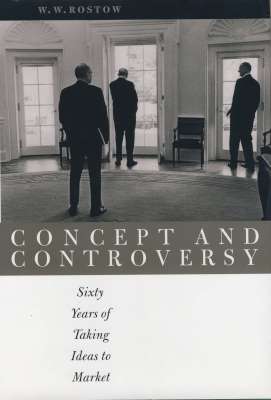 Austin, Tex.: University of Texas Press 1998.
Austin, Tex.: University of Texas Press 1998.
Concept and Controversy: Sixty Years of Taking Ideas to Market. Austin, Tex.: University of Texas Press 2003. (posthum erschienen)
Aufsätze
Marx Was a City Boy, or Why Communism May Fail. In: Harper´s Magazine 210.1955, Nr. 1257. S. 25-30. Auch in Rostow 1988. S. 31-41.
Tendenzen der Produktionsmittelverteilung im säkularen Wachstum. In: Zeitschrift für Nationalökonomie 15.1955. S. 73-80.
The Take-off into Self-sustained Growth. In: Economic Journal 66.1956,1. S. 25-48.
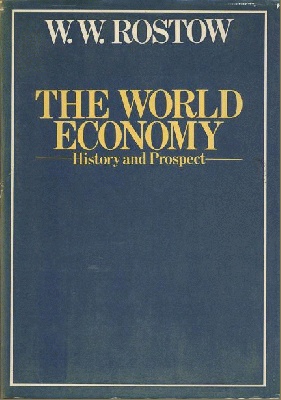 The Interrelation of Theory and Economic History. In: The Journal of Economic History 17.1957.
The Interrelation of Theory and Economic History. In: The Journal of Economic History 17.1957.
Mit Max Millikan
Foreign Aid: Next Phase. In: Foreign Affairs 36.1957/58,3. S. 418-436.
Rostow on Growth: A Non-communist Manifesto. In: The Economist, August 15, 1959, S. 409-416; August 22, 1959, S. 524-531.
The Stages of Economic Growth. In: Economic History Review 11.1959. S. 1-16. (deutsch u.d.T. Stadien wirtschaftlichen Wachstums und Probleme der friedlichen Koexistenz. In: Zeitschrift für die gesamte Staatswissenschaft 117.1961,1. S. 1-18.) = Moskauer Vortrag vom 25.5.1959
The „New Look“ in U.S. World Policy. In: U.S. News and World Report February 13, 1961. S. 57-81.
 The Third Round. In: Foreign Affairs 42.1963,1. S. 1-10.
The Third Round. In: Foreign Affairs 42.1963,1. S. 1-10.
The Challenge of Democracy in Developing Nations. In: Department of State Bulletin 50.1964, February 17. S. 251-260.
The Chapter that Keynes Never Wrote. In: Department of State Bulletin 52.1965. S. 454-459.
Mit Frederick E. Fordyce
Growth Rates at Different Levels of Income and Stage of Growth: Reflections on Why the Poor Get Rich and the Rich Slow Down. In: Research in Economic History 3.1978. S. 47-86.
Development: The Political Economy of the Marshallian Long Period. In: Meier/Seers 1984. S. 229-261.
On Ending the Cold War. In: Foreign Affairs 65.1987. S. 831-851.
Reflections on Political Economy: Past, Present, and Future. In: Michael Szenberg (Hrsg.), Eminent Economists: Their Life Philosophies. Cambridge: Cambridge University Press 1992. S. 222-235.
Herausgeber
The Economics of Take-off into Sustained Growth. New York: St. Martin´s Press 1963.
 |
Rostows Darstellung der Wachstumsstadien in ausgewählten Ländern (1960).
|
Autobiographie
View from the Seventh Floor. New York: Harper & Row 1964.
My Life Philosophy. In: The American Economist 30.1986, Autumn. S. 3-13.
Introduction: Notes on Lively Half-century. In: Rostow 1988. S. 1-6.
Sekundärliteratur
Arndt, H.W.: The Rise and Fall of Economic Growth: A Study in Contemporary Thought. Sydney 1978.
Baran, Paul A./Hobsbawm, Eric J.: The Stages of Economic Growth. In: Kyklos 14.1961,2. S. 234-242.
Cairncross, A.K.: Essays in Bibliography and Criticism XLV. The Stages of Economic Growth. In: Economic History Review 13.1960/61. S. 450-458.
Fisher, Sethard: Economic Development: Rostow, Marx and Durkheim. In: Journal of Developing Societies 9.1993,1. S. 53-66.
Fishlow, Albert: Empty Economic Stages? In: Economic Journal 75.1965, Nr. 297. S. 112-125.
Foster-Carter, Aidan: From Rostow to Gunder Frank: Conflicting Paradigms in the Analysis of Underdevelopment. In: World Development 4.1976. S. 167-180.
Galbraith, John Kenneth: For Foreign Aid in a New Packaging. Review of A Proposal: Key to an Effective Foreign Policy, by Max F. Millikan and W.W. Rostow. In: New York Times Book Review, 18 January 1957. S. 7, 22.

|
Portraitzeichnung Rostows aus dem "Economist" anläßlich der Erstveröffentlichung seines Werks "The Stages of Economic Growth" (1959)
|
Helleiner, Gerald: Comment. In: Meier/Seers 1984. S. 262-267.
Hicks, J.R.: Review of the Process of Economic Growth, by W.W. Rostow. In: The Journal of Political Economy 41.1953. S. 173-174.
Hoselitz, Bert F.: The Conditions of Economic Growth. Review of The Process of Economic Growth, by W.W. Rostow. In: The Journal of Economic History 13.1953. S. 202-204.
Ish-Shalom, Piki: Theory Gets Real, and the Case for a Normative Ethic: Rostow, Modernization Theory, and the Alliance for Progress. In: International Studies Quarterly 50.2006. S. 287-311.
Knall, Bruno: Wirtschaftserschließung und Entwicklungsstufen. Rostows Wirtschaftsstufentheorie und die Typologie von Entwicklungsländern. In: Weltwirtschaftliches Archiv 88.1962,I. S. 184-258.
Mason, E.S.: Stages of Economic Growth Revisited. In: Kindleberger/di Tella 1982. S. 116-140.
Menzel, Ulrich: Walt Whitman Rostow (1916-2003). Ein nicht-kommunistisches Manifest. In: Entwicklung und Zusammenarbeit 44.2003,12. S. 466-470.
Milne, David: America´s Rasputin: Walt Rostow and the Vietnam War.
New York: Hill and Wang 2008.
Mohammed, Azizali F.: Comment. In: Meier/Seers 1984. S. 268-271.
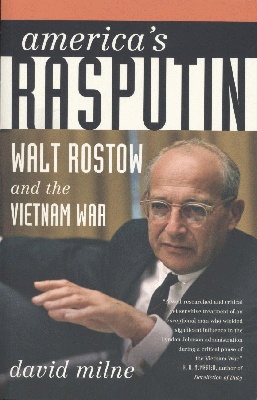
North, Douglas C.: A Note on Professor Rostow's "Take-Off" into Self-Sustained Economic Growth. In: The Manchester School of Economic and Social Studies 26.1958. S. 68-75.
Ohlin, Goran: Reflections on the Rostow Doctrine. In: Economic Development and Cultural Change 9.1961,4. S. 648-655.
Paulsen, Andreas: Zur theoretischen Bestimmbarkeit der Rostowschen "Stadien". In: Wilhelm Abel/Knut Borchardt/Hermann Kellenbenz/Wolfgang Zorn (Hrsg.), Wirtschaft, Geschichte und Wirtschaftsgeschichte. Festschrift zum 65. Geburtstag von Friedrich Lütge. Stuttgart: Gustav Fischer 1966. S. 306-324.
Pearce, Kimber Charles: Rostow, Kennedy, and the Rhetoric of Foreign Aid. East Lansing: Michigan State University Press 2001.
Postan, W.W.: Walt Rostow: A Personal Appreciation. In: Kindleberger/di Tella 1982. Bd. 1. S. 1-14.
Rosowsky, Henry: The Take-off into Sustained Growth Controversy. In: Journal of Economic History 25.1965,2. S. 271-275.
Solivetti, Luigi M.: W.W. Rostow and His Contribution to Development Studies: A Note. In: The Journal of Development Studies 41.2005,4. S. 719-724.
Supple, Barry: Revisiting Rostow. In: The Economic History Review 37.1984. S. 107-114.
Wright, David McCord: The Growth Must Come from Freedom. Review of The Stages of Economic Growth, by W.W. Rostow. In: Fortune, December 1959. S. 137, 212.
Festschrift
Kindleberger, Charles P./di Tella, Guido (Hrsg.), Economics in the Long View: Essays in Honour of Walt Whitman Rostow. Bd. 1: Models and Methodology. Bd. 2: Applications and Cases, Part I. Bd. 3: Applications and Cases, Part II. London: MacMillan 1982.
Zum Weiterlesen
Baumann, Yvonne: John F. Kennedy und "Foreign Aid". Die Auslandshilfepolitik der Administration Kennedy unter besonderer Berücksichtigung des entwicklungspolitischen Anspruchs. Stuttgart: Franz Steiner 1990.
Camargo, Alberto Lleras: The Alliance for Progress: Aims, Distortions, Obstacles. In: Foreign Affairs, October 1963. S. 25-37.
Hanson, Simon G.: Dollar Diplomacy: Modern Style: Chapters in
the Failure of The Alliance for Progress. Washington D.C.: Inter-American Press 1970.
Levinson, Jerome/de Onis, Juan: The Alliance That Lost Its Way: A Critical Report on the Alliance for Progress. Chicago, Ill.: Quadrangle Books 1970.
Meier, Gerald M./Seers, Dudley (Hrsg.): Pioneers in Development. New York: Oxford University Press 1984.
Meier, Gerald M.(Hrsg.): Pioneers in Development: Second Series. New York: Oxford University Press 1987.
Millikan, Max F./Blackmer, Donald L.: The Emerging Nations: Their Growth and United States Policy. Boston 1961.
Morgenthau, Hans Joachim: A Political Theory of Foreign Aid. In: American Political Science Review 56.1962. S. 301-309.
Packenham, Robert A.: Liberal America and the Third World: Political Development Ideas in Foreign Aid and Social Science. Princeton: Princeton University Press 1973.
Rabe, Stephen G.: The Most Dangerous Area in the World: John F. Kennedy Confronts Communist Revolution in Latin America. Chapel Hill: University of North Carolina Press 1999.
Rogers, William D.: The Twilight Struggle: The Alliance for Progress and the Politics of Development in Latin America. New York: Random House 1967.
Scheman, L. Robert (Hrsg.): The Alliance of Progress: A Retrospective. New York: Praeger 1988.
Schlesinger, Jr., Arthur: A Thousand Days: John F. Kennedy in the White House. Boston, Mass.: Houghton Mifflin 1965.
Links
Artikel von Ulrich Menzel (2003) unter
http://www.inwent.org/E+Z/content/archiv-ger/12-2003/trib_art1.html
Nachruf auf Walt W. Rostow in der New York Times vom 15.3.2003
http://www.nytimes.com/2003/02/15/us/walt-rostow-adviser-to-kennedy-and-johnson-dies-at-86.html?scp=2&sq=walt%20rostow&st=cse
Interview mit Walt W. Rostow zum Vietnam-Krieg, bereitgestellt vom National Security Archive (1998)
http://www.gwu.edu/~nsarchiv/coldwar/interviews/episode-9/rostow1.html
Walt W. Rostow und die Gründung des MIT Center for International Studies (CENIS)
http://web.mit.edu/CIS/pdf/Panel_ORIGINS.pdf
Aktueller Internetauftritt des MIT Center for International Studies (CENIS)
http://web.mit.edu/cis/
UM
